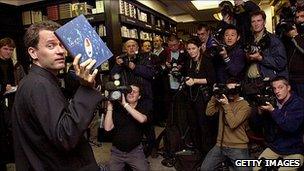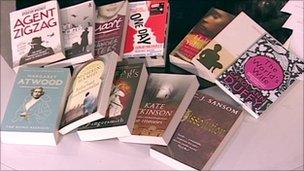Homeless group in World Book Night giveaway
- Published

Life Of Pi by Yann Martel (left) was the reading group's favourite book
A million books are being given away in book shops, libraries and cafes across the UK on Saturday as part of World Book Night, a campaign by publishers to promote reading.
In Manchester, the organisers of a reading group for homeless people will be handing out books. They explain why they think reading can change lives.
The reading group ran last year at Manchester Central Library and took in books from Yann Martel's Life Of Pi to Dickens' A Tale Of Two Cities.
"I was speaking to a homeless guy one morning and he started telling me about how much he read, and out of that came the idea," explains David Dennehy, who set up the group.
"Well, if lots of homeless people are reading, why don't they get together and read?"
It was, he says, "a distraction from the harsh realities of everyday life".
But it was more than just a chance to get together and forget their problems.
For some, the intellectual interaction was the springboard to further positive steps, while others took advantage of the practical information and support in the library, such as information about courses.
"It was being part of normal society," Mr Dennehy says. "A lot of homeless people have to go to some effort to keep away from drink and drugs, or people who are involved in drink and drugs, so it was also setting a social norm, if you like - there is more to life."
Libby Tempest, cultural services and events manager for the Manchester Library Service, ran the group and says members were initially surprised to find they were welcome in the library, and were not treated as uneducated just because they were homeless.
"People would come along because it was great to sit in a nice warm room and have a cup of tea and a biscuit and talk about books, but the thing about a reading group is it's a waste of time being in one if you haven't actually read the book," she says.
"Inevitably the people who came along were people who enjoyed reading and were readers.
"There's an assumption that just because someone's homeless, they might be illiterate or unintelligent or they won't be a reader. Just to break down that assumption was a very powerful thing to do."

Twenty-five different titles are being given away during World Book Night
The biggest hit with the reading group was The Life Of Pi, which won the Booker Prize in 2002 and tells the fantastical story of a man stranded on a boat with a Bengal tiger.
Asked why it was so popular, Mr Dennehy explains: "It's the story of surviving impossible odds. But not a misery story of a miserable life."
The Life Of Pi is one of the books that will be given away to homeless and other people from marginalised communities on Saturday at The Mustard Tree support centre in Manchester.
'Empowering'
The venue is also hosting an open-mic session for writers, actors, poets and singers, and Ms Tempest is hoping it will also help spread the word about libraries.
"It isn't just that homeless people have the right to come here, it's that they are positively welcome here," she says. "That's the message I need to get across."
The benefits of a reading group, with its camaraderie, stimulation and practical support, are easy to see. But what can be gained from handing out books for people to read on their own?
Ms Tempest believes reading can be "empowering" because it can make a person more articulate and improve their vocabulary and reading skills. Those things, in turn, can enhance the chances of getting a job.
But as well as that, reading helps you see the world from other people's points of view and to realise that others have been through similar things, and come through the other side. "Sometimes, just that feeling that it's not just you is enough," she says.
Mr Dennehy agrees. "For some people, it allows them to read narratives of life stories that they can relate to," he says. "For others, it makes explicit how other lives are possible to be lived.
"If that character can achieve that, then maybe I can."
- Published6 March 2011
- Published2 December 2010